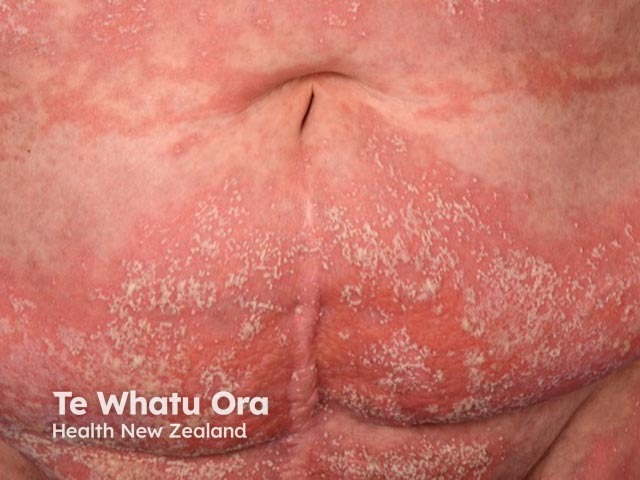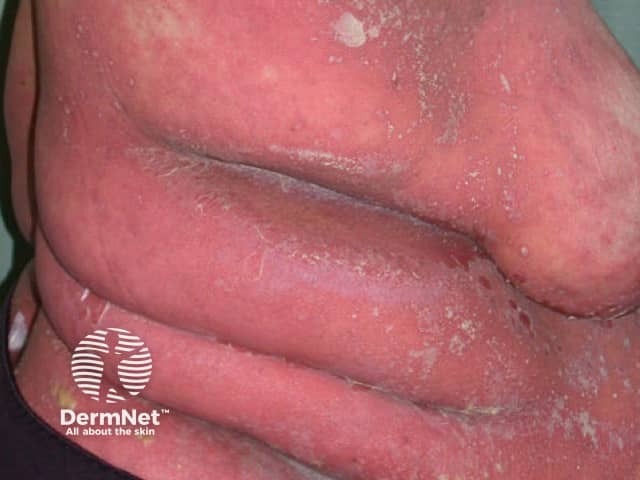Main menu
Common skin conditions

NEWS
Join DermNet PRO
Read more
Quick links
Spesolimab — extra information
Treatments Autoimmune/autoinflammatory
Spesolimab
December 2022
Author: Dr Audrey Ho, Resident, Singapore General Hospital, Singapore (2022).
Reviewing dermatologist: Dr Ian Coulson
Edited by the DermNet content department
Introduction
Uses
How it works
Dosing and administration
Benefits
Side-effects
Contraindications
Introduction
In September 2022, spesolimab was approved by the US Food and Drug Administration (FDA) as a biological treatment for generalised pustular psoriasis flares (Spevigo®).
In October 2021, the European Medicines Agency (EMA) validated the marketing authorisation application, which is under review.
What is spesolimab used for?
Spesolimab is approved for use in generalised pustular psoriasis (GPP).
There are also trials evaluating the efficacy of spesolimab for palmoplantar pustulosis. A pilot study (Mrowietz et al, 2021) found that spesolimab was well tolerated but did not meet the primary endpoint for efficacy in treating palmoplantar pustulosis. A phase IIb trial is underway.
There are case reports of successful treatment for severe pyoderma gangrenosum and acute generalised exanthematous pustulosis (AGEP), and acute febrile neutrophilic dermatosis (Sweet syndrome).

Sheets of pustules coalescing into lakes on the abdomen in generalised pustular psoriasis

Erythrodermic generalised pustular psoriasis

Superfical pustules in generalised pustular psoriasis
More images of generalised pustular psoriasis
How does spesolimab work?
Spesolimab is a humanised monoclonal antibody that binds to interleukin 36 (IL-36) receptors and prevents binding of IL-36, preventing activation of proinflammatory pathways.
As the IL-36 pathway is integral in the pathogenesis of GPP, its downregulation is proposed to help relieve GPP flares.
IL-36 has also been shown to play a role in the pathogenesis of palmoplantar pustulosis, and the use of spesolimab in this context is being investigated.
Spesolimab dosing and administration
- Administered as a single 900mg dose (diluted prior to administration in sterile 0.9% sodium chloride injection) by intravenous (IV) infusion over 90 minutes.
- Not to be combined with other medications during infusion.
- The infusion should be discontinued if a reaction occurs. In the case of mild reaction, restarting the infusion at a slower rate (over maximum 180 mins) can be considered.
- If GPP symptoms persist, an additional 900mg dose one week after the initial dose can be given.
What are the benefits of spesolimab?
Effisayil-1, a phase II, multi-centre, randomised, double-blind, placebo-controlled trial (Bachelez et al, 2021), examined the efficacy of spesolimab in 53 patients with moderate-to-severe generalised pustular psoriasis (GPP) flares.
- Spesolimab was associated with a higher incidence of lesion clearance at 1 week compared to placebo, as assessed using the GPP Physician Global Assessment (GPPGA) score.
- To be eligible for randomisation, patients had to have a GPPGA score of ≥3.
- One week after administration of either 900mg IV spesolimab or placebo, 54% of patients in the spesolimab group had a pustulation subscore of 0, compared to 6% in the placebo group (p <0.001).
What are the potential side effects of spesolimab?
Reported side effects in patients given spesolimab include:
- Pyrexia (potentially attributable to generalised pustular psoriasis)
- Infection (eg, cellulitis, UTI, respiratory tract infection, bacteraemia, herpes simplex)
- In the 12-week assessment extension period of Effisayil-1 trial (Bachelez et al, 2021), 47% of the 51 patients who received at least 1 dose of spesolimab reported infection, including UTI, upper respiratory tract infection, influenza, otitis externa, and folliculitis
- Prurigo
- Pruritus
- Urticaria
- Injection site reaction
- Infusion site haematoma and bruising
- Fatigue
- Nausea and vomiting
- Headache
- Drug reaction with eosinophilia and systemic symptoms (DRESS).
Warnings
- May increase risk of infection.
- Evaluate patients for tuberculosis before treatment with spesolimab.
- Manufacturer advises avoiding concurrent use of live vaccinations with spesolimab. See also: Immunisation in immunosuppressed dermatology patients.
- There is limited or no data on the use and safety of spesolimab in pregnant, breastfeeding, paediatric, or geriatric patients.
What are the contraindications to spesolimab?
- Severe or life-threatening hypersensitivity to spesolimab or its excipients.
- Do not give spesolimab during clinically significant active infection, including active tuberculosis infection.
Approved datasheets are the official source of information for medicines, including approved uses, doses, and safety information. Check the individual datasheet in your country for information about medicines.
We suggest you refer to your national drug approval agency such as the Australian Therapeutic Goods Administration (TGA), US Food and Drug Administration (FDA), UK Medicines and Healthcare products regulatory agency (MHRA) / emc, and NZ Medsafe, or a national or state-approved formulary eg, the New Zealand Formulary (NZF) and New Zealand Formulary for Children (NZFC) and the British National Formulary (BNF) and British National Formulary for Children (BNFC).
Bibliography
- Bachelez H, Choon SE, Marrakchi S, et al. Inhibition of the Interleukin-36 Pathway for the Treatment of Generalized Pustular Psoriasis. N Engl J Med. 2019;380(10):981–3. doi 10.1056/NEJMc1811317. Journal
- Bachelez H, Choon SE, Marrakchi S, et al. Trial of Spesolimab for Generalized Pustular Psoriasis. N Engl J Med. 2021;385(26):2431–40. doi 10.1056/NEJMoa2111563. Journal
- Boehringer Ingelheim Pharmaceuticals. Spevigo Prescribing Information. Sept 2022. Available from: https://www.accessdata.fda.gov/drugsatfda_docs/label/2022/761244s000lbl.pdf
- Mrowietz U, Burden AD, Pinter A, et al. Spesolimab, an Anti-Interleukin-36 Receptor Antibody, in Patients with Palmoplantar Pustulosis: Results of a Phase IIa, Multicenter, Double-Blind, Randomized, Placebo-Controlled Pilot Study. Dermatol Ther (Heidelb). 2021;11(2):571–85. doi 10.1007/s13555-021-00504-0. Article
- Pang Z, Wu C, Liu J, Liu Y, Jin H. Spesolimab Response in a Patient With Steroid-Resistant Sweet Syndrome. JAMA Dermatol. 2025;161(1):110-112. PubMed
On DermNet
- Generalised pustular psoriasis images
- Generalised pustular psoriasis
- Palmoplantar pustulosis
- Biological treatments
- Immunisation in immunosuppressed dermatology patients
Other websites
- Spevigo ® (spesolimab) prescribing information — Boehringer Ingelheim Pharmaceuticals
